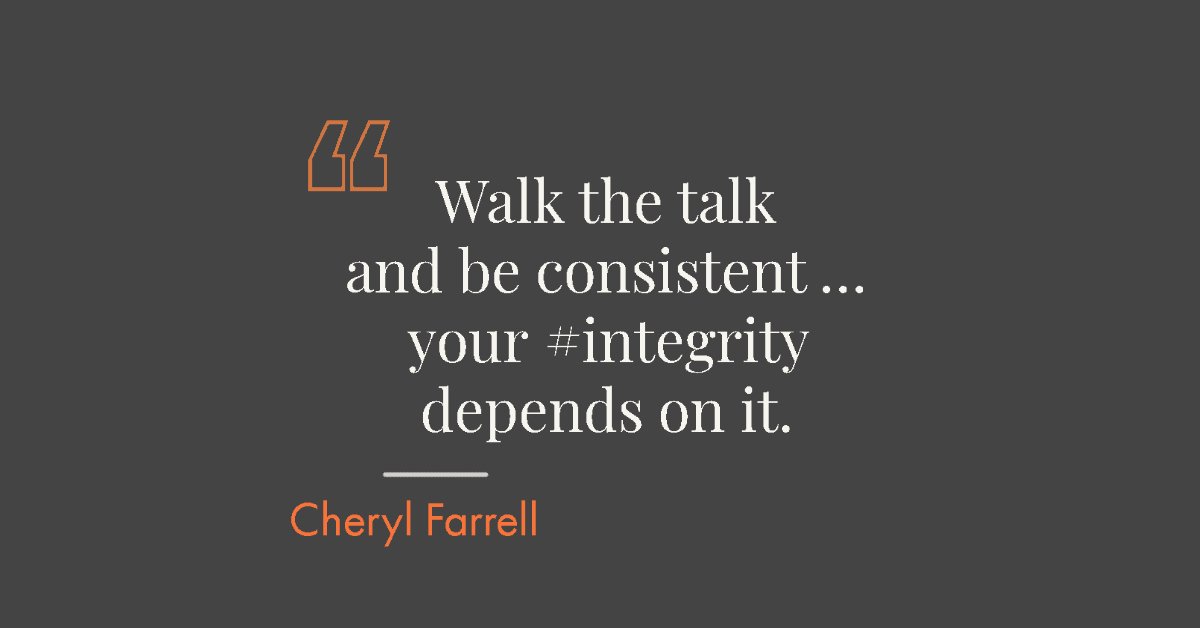This month, while we focus on the idea of integrity (the quality of being honest and having strong moral principles; moral uprightness), Cheryl Farrell shares her experience and asks some important questions:
How do customers perceive your company’s image and reputation?
Anti-racist policies and social justice efforts are an important part of brand #integrity.
Does your company walk the talk?
What’s Your Hashtag?
I learned to type on an IBM Selectric typewriter. Back in the day, the “#” keyboard symbol was an abbreviation for number as well as for weight measured in pounds. In 2007, the symbol became known as a hashtag to create groups on Twitter.
These days, a hashtag communicates personal brand or point of view based on what follows the symbol. Case in point: #BlackLivesMatters
People are grappling with what to do and what to say on matters of social justice even though anti-racism resources abound. As we find our way, advocating for equality is most effective when behavior aligns with the cause.
Walk the talk and be consistent …
your brand #integrity depends on it.
In the aftermath of George Floyd’s death, I questioned a C-Suite executive on his company’s approach to diversity. He works for a large shoe retailer that sent an email declaring Black lives matter. Sadly, my shopping there (while Black) did not support the statement.
In August 2019, I visited their shoe store near Calabasas, not far from where I live. It was midweek and I was one of a few customers in the cavernous showroom. I’ve been a VIP rewards member of the retailer for more than a decade, but within an hour of entering the store, I didn’t feel special.
I headed to the boot section and took a seat on a footstool available to customers. I was trying on a pair of brown riding boots when a young white sales clerk approached to my right and began inspecting shoe boxes nearby. She asked if I needed help. Looking up from my seat, I politely replied that I did not. As she lingered, my spidey sense went on alert.
And it continued…
Several minutes later, another young white sales clerk approached to my left. She too began shuffling boxes for no apparent reason. The tidying-up continued and I could tell something was happening.
Flanked by the two clerks, I calmly asked them if it was a coincidence that both were in the aisle fussing with shoe boxes. When they didn’t reply, I asked if they thought I was stealing their shoes. I got no response. I politely offered to let them look inside my red leather Calvin Klein tote that, by the way, I had purchased from their store six months earlier. I don’t recall either of the women denying my assertion of being stalked. They floated away as if a light flashed on ghosts.
When I went to the front counter to pay for my items, the two female clerks were standing with their young white male manager. I asked if he overheard my earlier questions to his staff. He looked nervous as if braced for a confrontation. He denied any negative motive on their part. I said their conduct suggested otherwise. I didn’t make a scene, but I firmly stated how I felt about their actions.
Then came the #BlackLivesMatter email
Two days later, I received a customary questionnaire about my shopping experience. I called the customer service helpline to tell them how I was treated. The representative apologized and offered VIP shoe-buying points for my discomfort. I was placated by the gesture … until this year. That’s when a new email arrived with a robust announcement that Black Lives Matter.
RELATED: Brought to My Knees: Facing My Own Thoughts on Racism, Tolerance, Love.
The email appeared to be more-talk-than-walk about deploring racism. I contacted customer service again and this time I asked if sales training was provided to their staff to avoid racial profiling.
When they could not answer my question, I contacted an executive at the company’s headquarters and explained my shoe buying encounter last year. I said companies don’t earn good citizenship points by sending a #BlackLivesMatter email. They must do the work. To his credit, the leader spoke candidly and acknowledged the company’s social justice efforts were earnestly in progress. He offered to keep the discussion going.
Stand Up for the Cause with Brand #integrity
For many organizations, anti-racist policies are still being developed. Opportunities to do the right thing are fraught with pushback and stumbles. But, it’s bigger than selling shoes or any product. It’s about people being marginalized because of the color of their skin. Standing up for the cause is worthy and the march forward leads to brand #integrity.
3 Steps to Brand #integrity
1. Say what you mean
2. Mean what you say
3. Do what you say

Letting Go of Bitterness After Being Betrayed
By living we take risks. By trusting we take the biggest risk of all. When betrayal happens our foundation crumbles … READ MORE

Cheryl Farrell
Cheryl Farrell is a corporate communications consultant and performance storyteller in Southern California. She has decades of experience in healthcare, education, and financial services. Cheryl was an original cast member of the Jeopardy! Clue Crew and toured the world appearing in more than 1,000 video clips. As a public speaker, she often examines how older black women excel at the intersections of race, gender, and age. Cheryl has a master’s degree in Communication Management from USC and a bachelor’s degree in economics from UCLA. She is married and has two adult children.
Photo credit - NiketaCH Photography
Connect With Us on Social Media!
RECENT FAVES
Tips for Hitting the Road with Your Furry Friends
Part 1 of Kathlene McGovern’s 2 part series on the best and safest ways to travel with your furry friends!
I’m Just Curious
Dove Rose give us ideas on how to stay curious! Keep it Fresh in the Kitchen, on the Drive and in your Life. New ideas to keep our mind alive!
Living Unhoused for a Week: Ken Craft Takes to the Streets
Ken Craft of Hope of the Valley lives unhoused on the streets of the San Fernando Valley for 100 hours and shares the challenges, insights and struggles he faced on this journey.





September insidewink. Is one of the best to remind us not only who we are but who we could/should be.
Thank you all!